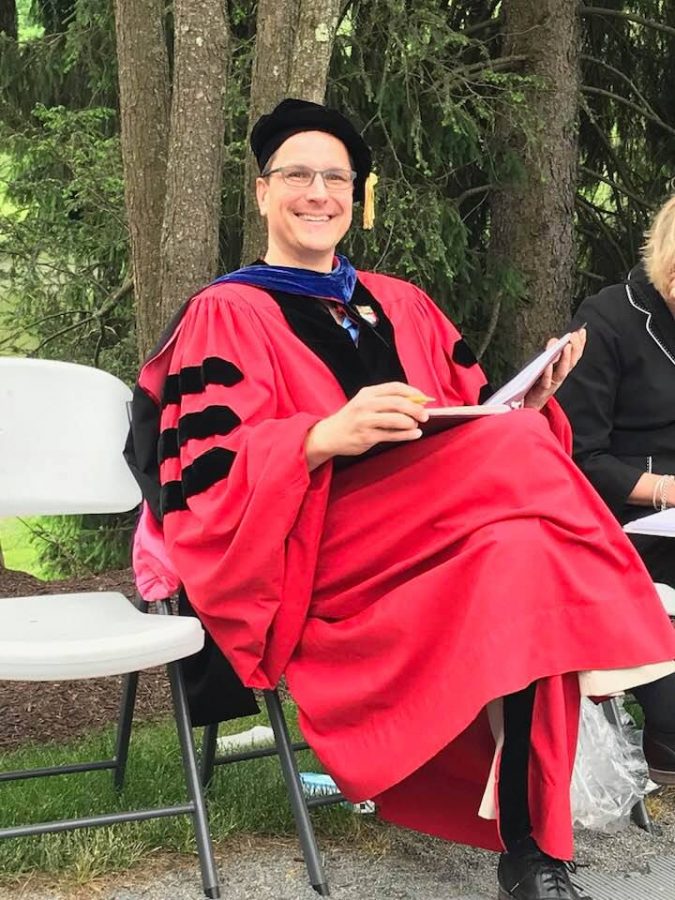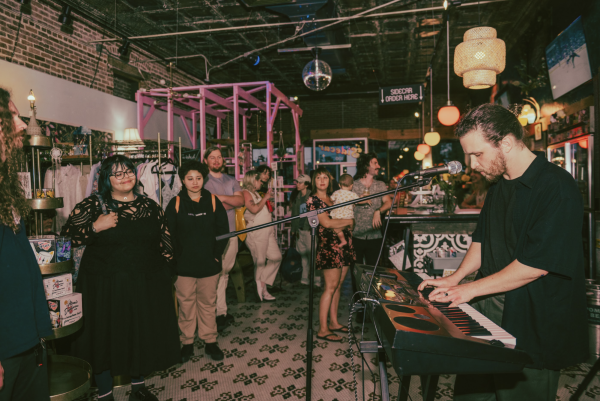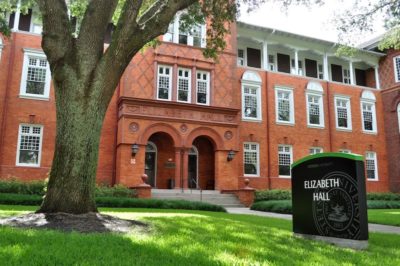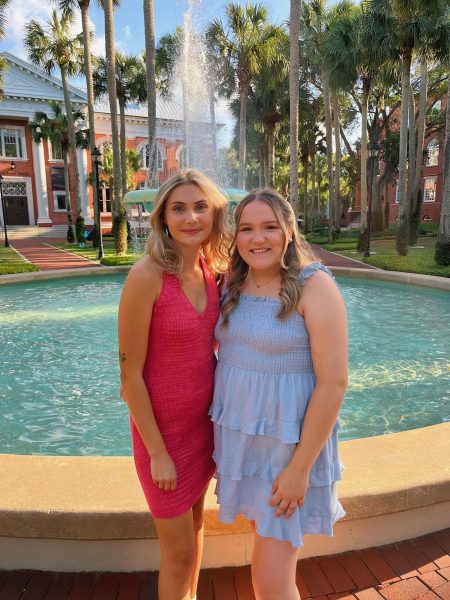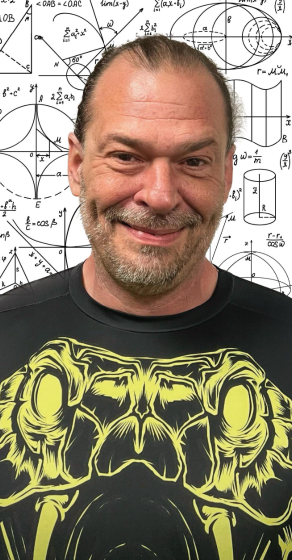Getting to Know Stetson’s President-Elect, Christopher Roellke, Ph.D.
By now, the Stetson community is aware that Christopher F. Roellke, Ph.D. has been selected to succeed Wendy B. Libby, Ph.D. to become the university’s 10th president, effective July 1, 2020. To learn what lies beyond his accomplishments as Dean of the College Emeritus and Professor of Education at Vassar, I elected to give him a call last week to learn about his background and find out just what he has in store for Stetson in the coming years. Here’s what he had to say.
Hatter Network: So the first thing I want to ask you is how you pronounce your last name because a lot of us have been saying it differently.
Christopher F. Roellke: It’s sorta like ROL L. K. E. Y. That’s an easy one.
HN: And what does the F stand for?
CR: Forbes like the magazine, although there’s no relation regretfully. The first president [of Stetson’s] last name is also Forbes.
HN: Oh. So it’s like a sign from the universe.
CR: Right. And John B. Stetson and I were born in the same city, which is kind of cool.
HN: So how did you find Stetson? How did you realize that this was a job you wanted?
CR: Sure, sure. Well, my nephew was a graduate of the Stetson class of 2005, so I was familiar with it, through him. And I’ve always admired [the school] from afar, not only because of the education my nephew received, but because it seemed to be really a place that was very deeply committed to teaching and learning in particular experiential learning and you know, bridging any gap between theory and practice is huge. The students get a chance to apply what they’re learning in the classroom, in real world settings, which really appeals to me and is consistent with my own thinking about education.
HN: Awesome. So something that’s in your bio and the website is your view on education. It says that your research and leadership or interest are in the politics and economics of education. Can you kind of define that and go into what that thinking is and how you want to apply that to Stetson?
CR: Let me just say that really all of my leadership opportunities and anything I’ve done either as a faculty member or as a leader in higher education has been focused on how do we best help students learn. And of course that requires resources. So I’ve always been interested in the allocation of resources, particularly human resources, in the field of education. So in most institutions, and certainly true in K-12 education as well as higher ed, nearly 70 percent of the investments we make are in the people that we employ to do the education. So I’m always fascinated by that. In other words, how we allocate people’s time to the classroom, to eligibility services and things like that. It’s always been fascinating to me because it is the greatest single investment we make in young people, so always at the forefront of my consciousness is how do we best deploy those resources to promote learning.
HN: So, with that being said, what do you think is wrong with the college education system in America?
CR: Well, I think a huge problem has been access and affordability to higher education, among an increasingly diverse student population. So I think that’s really at the forefront of my concern. And that’s connected to, again, the interest in the politics and economics of education. How do we make this type of education, particularly residential, more available to a wider range of students. That’s a very, very pressing issue. I also think our country is incredibly divided, politically and I would hope that could be a place that can actually serve as a lighthouse for how dialogue across differences can actually occur. Because we are so incredibly divided in the political sphere, it would be wonderful to find a place of learning where we can actually have disagreements, but do so in a civil manner.
HN: I saw that you have a BA in American government. How did you go from American government to working in higher education?
CR: Sure. When I was at Wesleyan as an undergraduate, I was interested in two things really, in the law and I was also interested in education. I also got certified to teach through Wesleyan. So as I was sort of navigating my thought process about what I’d like to do for a career, I was debating between actually becoming an attorney, working on, education rights, and staying in the classroom in some capacity. So one thing led to another and when I went to graduate school at Cornell, that’s where I fell in love with college teaching. And I said, “this really feels right.” I still had an interest in education law, but really have had no regrets that I chose the education path.
HN: And what about when you were growing up? Did you have a particular thing in your mind where you were like, I really want to do this? Did you have any lofty childhood goals?
CR: Really generous question. I mean, I think, like a lot of young kids growing up, I thought I was going to be a professional athlete. I didn’t find my intellectual goals until probably college, I didn’t have any grand plans. I’m a big believer that, you turn every corner and you explore and you sort of figure it out as you go along, even though I know that’s just comforting for some people to do. I really felt like I wanted to try a number of different things on for size before I made a commitment to a longer term career.
HN: So when you said you wanted to be a professional athlete, what did your parents think about that?
CR: Well first, I’m the last of seven kids. And so, athletics and recreation play and music all played an important part of our education growing up. My dad played basketball at Duke. My sisters were good athletes and my brothers were good athletes and musicians. I didn’t get any of the musical talent, but I got some of the athletic piece. It wasn’t as though we were super duper competitive and you had to always win. It was just that our family valued teamwork, valued sportsmanship and being part of something that was bigger than yourself and I’ve always admired that about athletics.
HN: Are those values things that you brought in with your time as Dean of Vassar?
CR: I spent a lot of my time throughout my 21 years at Vassar trying to literally break down fences between the college and the local community because I felt so strongly that some of the most learning experiences were actually outside the classroom, not at all to diminish the importance of inside the classroom. So I devoted a considerable amount of my time working with local area school systems and what have you basically get some air in the written work that you’ve got. Then the Vassar College urban education initiative which I started as a faculty member 15 years ago, which was to try to create a, again, better a partnership between the local area school systems and Vassar College. And very proud of those programs, including an after school tutoring program, an intensive exploring college program, which gives a rising juniors from Poughkeepsie the opportunity to be on campus, all courses with master faculty and local area school teachers.
HN: So what issues do you think Stetson currently has that you want to work to fix?
CR: I think it’d be premature for me to identify all the things that we would want to tackle together. I think [for] most of higher education, financial sustainability is going to be a challenge, for all institutions. How do we make sure our campuses are as inclusive and welcoming as they possibly can be for a changing demographic? I did share with the search committee and others that I’d like to see Stetson’s retention rate get a little bit higher, meaning that we admit these wonderful students, we want to make sure that they can thrive and get through the education, I know it’s creeping up a little bit, but it should be higher. So those are just a few of the things that are on my mind. Financial sustainability, inclusivity, [having a] welcoming community. And in the third one, which connects to the second one, is how do we retain students once we admit them?
HN: So we have a bit of a housing issue at Stetson right now. Basically what is happening is that people are being displaced in their living, there are some people where they’re three to a room or there are people who aren’t in Greek life and they are put in those fraternity/sorority houses that they’re not affiliated with. How do you think we can fix that?
CR: Again, I don’t want to put myself out there as knowing the answers to that until I get to know the problem a little bit, a little bit better. I do believe so strongly in the value of the residential components of a student’s education. So making sure that there’s adequate and comfortable and safe housing for students, I think is vital moving forward and might even be able to help us tackle some of that retention issue that I referred to earlier. So I’m all ears in terms of learning more about the challenge and I think perhaps it might be a function perhaps of the fairly exponential growth of Stetson over the last decade. I mean, the student body has grown considerably and some of that might have to get sorted out in terms of what other resources on campus would accommodate, that larger group of students. And it sounds like this might be one of the growing pains that Stetson might be experiencing. Again, maybe connected in some ways to some of the retention challenges. If you don’t have an adequate place to live, then you may look elsewhere. Do you know what I mean?
HN: Yes. Yeah.
CR: I also wonder if there’s some potential to collaborate with the community, the broader community outside of Stetson in DeLand to help solve this challenge. I don’t know to what extent Stetson is utilized housing outside the campus doesn’t own, but there could be some very interesting partnerships that could emerge to provide adequate housing for students.
HN: Another problem we have that you brought up a little bit earlier about inclusivity, we have a diversity problem on campus where a lot of people in underrepresented groups that don’t feel like their voices are important or are heard as much as they’d like, they feel like there aren’t enough of them to really have an impact. What do you think is the best way for Stetson, or a university in general, to become more diverse and open, accepting, etc.?
CR: As I identified earlier, I think this is one of the central both challenges and opportunities facing higher education today. And it’s a great question and I guess I’d like to answer it this way. Vassar [underwent] its second most dramatic demographic shift in its history, the first, the first being when we went co-educational in 1969 and the second over the last decade. We have quite intentionally tried to diversify our student body, with more robust financial aid packages, strategic recruiting of underrepresented groups, et cetera. And the transformation on campus has been quite dramatic. I have some experience in dealing with this. It’s never perfect, there was some growing pains with that too. I think a good approach as you want to meet the needs of particular communities, you want to provide robust and ample opportunities for multicultural interaction. And I think ultimately what the goal of engaged pluralism. So it’s kind of a three-step thing. You meet the needs of particular communities, which means things like adequate spaces for them to convene, making sure that they feel included and so on. So the more we can foster multicultural experiences, the better. With the goal of engaged pluralism I think that gets contagious. In other words, if those marginalized groups are traditionally underrepresented groups, they feel like they have a voice, I think it gets contagious because they have a positive Stetson experience, they go home, they speak to their friends and so on and so forth, and then you can start to get a bigger pool of those applicants to come in the future. If they don’t have a positive experience, then you’re kind of dead in the water.
HN: Continuing on the subject of student life, I am aware that Vassar doesn’t have any Greek life on campus. Greek life is pretty big here, I think about 30 percent of students at Stetson actively participate in Greek life. So I was wondering what you see as the role of Greek life on campus and what you see as the future for Greek life, either at Stetson or in American universities as a whole.
CR: You’re correct that Vassar does not have any fraternities or sororities, but I think there are also certainly affiliate affiliation groups in some ways that, that, operate similarly. Right? They either have a particular service objective or they, or there’s a congregation of folks because of similar interests and so on. I’m sort of familiar with Greek life through University of Richmond, certainly my undergraduate institution, Wesleyan had them. I did not know that there was a third, that participate in Greek life? Again I guess that’s something I’d like to put in my sort of parking lot to learn more about what the dynamic is at Stetson before I make any kind of judgements about it. It seems as though it’s a part of the fabric of Stetson and important traditions emerge from that. I also think it’s important that whatever regulations apply to the broader student body and also apply to the sororities and fraternities. ‘Cause this sort of stereotype about them can be difficult. I’ll stop there because I really don’t have a lot to say on that particular topic. I’d like to find out more.
HN: What was the biggest problem that you faced at Vassar that you had to creatively solve?
CR: I would say two. I would say one was right after I became the Dean, the great recession hit. We lost 27 percent of our value of our endowment and at the same time we were undergoing our most ambitious demographic shifts in the college’s history as I referred to earlier. So those were together a sort of a simultaneous challenge, right? And opportunity. So we didn’t have as much money as we used to have to be able to provide resources for a changing demographic. And I’m really proud of what we were able to accomplish despite having fewer dollars to do it. So the way we solved that we all put our heads together and figured out what is most important, how do we provide first rate services for faculty and students with, a smaller budget, and how do we, again, try to achieve that mission that we all agreed upon, with fewer resources. So those are the two key challenges. I would say the financial challenge of the associated with the great recession. And again, how do we achieve our inclusivity welcoming and diversity goals in that context. Because we came to solutions collaboratively, I think we became through pretty strong.
HN: So what did you learn from this experience? I mean, you said that doing it collaboratively was good, but was there something that you didn’t know about working in higher education or just life in general that you took from this afterward?
CR: From my time as Dean, yes. I think I have learned that our students do turn over right every four years. Hopefully if all goes well. And I think I’ve learned that you have to keep that at the forefront of your consciousness. You need to develop relationships with those new students all the time, right? Because they’re new members of the community. You can’t rest on your morals. You’ve got to be able to continue to nurture relationships and trust building, particularly as members of the community turnover in particular students are in. There are faculty turnovers but less frequently. I guess that’s something I learned is that you always have to constantly nurture the relationships that you have on a campus.
HN: Great. So that’s all of the official type of questions that I have. I have some fun questions just as a quick thing so our students get to know you. So what’s your favorite book? And how has it inspired you?
CR: I mean, I’ve just finished “Educated” by Tara Westover. It’s really an amazing autobiography and it just again, shows the power of education, how someone can overcome challenging circumstances, to achieve and how the role education can play in changing one’s worldview. I put it on a high on my list as a really great book and certainly one to recommend.
HN: What about your favorite movie?
CR: My favorite movie, I’d have to say “The Shawshank Redemption. And it may seem a little sappy, but I also loved “On Golden Pond.” But I just loved the father-daughter relationship in that film and how it evolved over time, that relationship. So those are my two top ones.
HN: What about the best place you’ve ever been to?
CR: I would say the most magical place I’ve been has been Petra. I was there for an international education conference and was able to be in Amman, Jordan as well, but Petra is just an extraordinary place.I think that’s probably the most magical place I’ve been. Although I also will say we honeymooned in the Galapagos, which was fun because my wife is a scientist.
HN: Do you plan to live in the presidential house that’s right off of campus?
CN: Absolutely. Yes. I think it’s an important campus resource and I look forward to having members of the community over.
HN: What is your ideal day?
CR: My ideal day. I would say this, that one of the things I love about being an educator and administrator is that every day is different. So a good day for me is when it’s full of the unexpected, I certainly like to play like everybody else does, but I love unexpected interactions. I also love that if there could be part of that day that I could spend with my family, so not always as full as the day might be professionally, I would still want to have part of that day be carved out. I have three amazing daughters, amazing wife, and as I said earlier, a large extended family. So I would say a day full of unexpected surprises and challenges.
HN: So my final question is when do you plan to move to DeLand and are you excited to be in Florida or do you prefer New York to Florida?
CR: I start officially on July 1, 2020 but I’m going to be introduced to the community on Nov. 20 and 21. In a couple of weeks, my wife will join me for that and we will be visiting both Gulfport and DeLand and I am profoundly excited about this transition. Although New York has been our home for the last two decades, we’re very, very excited about becoming members of the new community. It’s the greatest privilege and honor of my professional life to be selected as [the] 10th president, I cannot be more excited and energized by this opportunity. I’m grateful for it.
HN: And I realize I have one more question. What are you going to do with all your winter coats?
CR: To be honest, I don’t have any winter coats. I’m one of those people that likes the freedom of my arms. So even when it’s cold out here, people think I’m nuts. I very rarely wear outer garments, even in the winter. I’m a rugged guy.
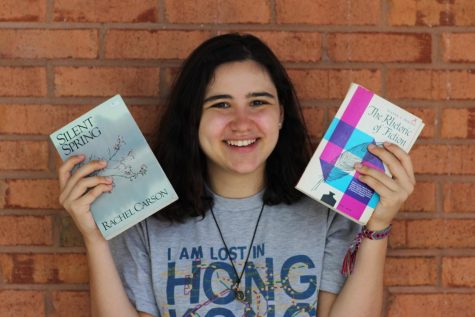
Ruby Rosenthal is prone to few things: making jokes in inappropriate situations, checking out more books from the library that she can feasibly read, and...


